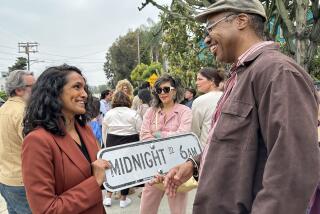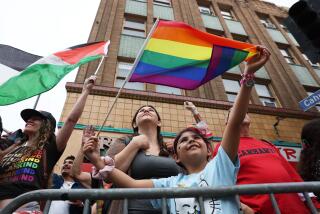They’re Not Wed, but They’ve Made It Official
When Aimee Wilson asked about adding her gay partner to her corporate health insurance plan earlier this year, her employer told her it would be easy. All she had to do was get a government body to sanction the relationship.
But for Wilson, a resident of Frisco, Texas, that was going to require some fancy bureaucratic two-stepping, because the Lone Star State doesn’t officially recognize same-sex partners.
For the record:
12:00 a.m. Dec. 3, 2004 For The Record
Los Angeles Times Friday December 03, 2004 Home Edition Main News Part A Page 2 National Desk 1 inches; 37 words Type of Material: Correction
West Hollywood officials -- A photo caption in Wednesday’s Section A with an article about the West Hollywood domestic partner registry called Jeffrey Prang the city’s mayor. Prang is a city councilman; the mayor is John Duran.
Wilson found her solution 1,400 miles away at West Hollywood’s City Hall, where, for a $25 fee, the clerk placed Wilson and her then-pregnant partner, Margaret Richmond, on the city’s domestic partnership registry in March. The couple dropped their check and a notarized application in the mail. Richmond made the company’s health insurance rolls in time to deliver twins.
“It really felt weird, especially having to go all the way across the country to get it,” Wilson said in a phone interview recently. “But it was kind of neat. We even got a certificate.”
As the new gay rights battles rage across the American landscape, creating a conflicting, state-by-state patchwork of rules on marriages and domestic partnerships, West Hollywood is among a handful of state and local governments that have been quietly reaching out to gay couples beyond their borders. The city offers to officially sanction unconventional relationships and, just as important, to do it by mail, saving out-of-state partners the cost of a plane ticket.
The policies are by no means as dramatic as those in San Francisco, where Mayor Gavin Newsom allowed gay couples to marry this year, until the actions were blocked by the California Supreme Court. Despite its cachet with insurance programs, the registration has no legal status outside the city boundaries.
But the registrations exemplify the peculiar jurisdiction-shopping gay couples are employing to maximize their rights in a deeply divided country.
Other governments that allow nonresident couples to register by mail include the city of Seattle and the states of Hawaii and California. The Golden State enacted its domestic partners law in 1999. A California secretary of state spokeswoman said the out-of-state provisions were necessary to extend pension benefits to former state employees who had moved elsewhere -- and also to help non-Californians sign up for corporate health insurance benefits.
But it is West Hollywood’s pioneering domestic partner registry, created in 1985, that remains one of the country’s best known, with its mail-in procedures listed on a number of gay rights websites. This year, the city’s loose registration rules have enticed 193 out-of-state couples to register -- accounting for about 60% of West Hollywood’s total domestic partnership rolls for 2004.
They are gay couples who are not allowed to marry and straight couples who choose not to. Many of their hometowns -- such as Grain Valley, Mo., and Waveland, Miss. -- are cultural galaxies from the raucous boys’ town bars of Santa Monica Boulevard.
At West Hollywood City Hall, their phone queries are met with a mix of delight and respect: Catherine Ross, a clerk’s office employee, marvels at the “sweet Southern voices” that call regularly, asking for details on the city law.
City Clerk Tom West maintains that the registry is an important part of the city’s mission to fight for gay rights beyond its borders.
“This does even the playing field a little bit,” he said. “But just a little bit.”
In Seattle, 31 of the 130 domestic partner couples who registered this year hailed from other states, such as Wisconsin and Alaska. Gay rights advocates such as Courtney Joslin of the National Center for Lesbian Rights say the tangled web of cross-country legal arrangements demonstrates how far gay couples have to go to win acceptance.
“Unfortunately, there are many places in the country [where] there’s no government entity ... where they can go to register their relationship,” she said. Gay couples “have to go far and wide to look for that.”
Socially conservative groups, however, see such laws in the same light as the state of Massachusetts’ recent sanctioning of gay marriage: a threat to communities that choose not to acknowledge such relationships.
“What it illustrates is the reason why we need a federal solution to the issue of same-sex relationships,” said Peter Sprigg of the Washington, D.C.-based Family Research Council, a conservative nonprofit. “Because when one municipality or state begins to legally recognize same-sex relationships, it affects other states -- even those who have not chosen that as a public policy.”
West Hollywood’s domestic partner registry was enacted largely in response to a local issue: the impact of AIDS on the city’s large gay community. Among other things, the law granted domestic partners basic rights within the city limits, such as hospital visits -- a right gay men often found they were denied because they were not defined as “family” or a “spouse.”
But it was always open to nonresidents as well, and became attractive to them as a symbolic recognition of their relationship, said John Heilman, who has been a West Hollywood councilman since the city’s inception 20 years ago.
Since that time, however, many of the nation’s employers have begun allowing domestic partners to register with their benefits plans -- an idea that didn’t seem feasible in the cultural climate of the 1980s, Heilman said. Today, nearly 40% of Fortune 500 companies offer such plans, according to the Human Rights Campaign, a gay advocacy group.
Many of those companies ask domestic partners to sign affidavits affirming their relationships, and file them directly with human resources. Others, such as the San Antonio-based SBC Communications, require that the relationships have the approval of a local government.
Over time, a West Hollywood domestic partnership certificate in a place such as Texas took on more than just symbolic value, and became a point of pride for the city.
“If there’s something we can do to equalize things -- to at least help people get some of the benefits, if not all of them -- I’m with that,” said Heilman, who is gay.
Of the half a dozen couples on West Hollywood’s registry contacted by The Times this week, all said they signed up because they wanted to add a partner to their employer’s benefits package.
Joe Cain is a 37-year-old customer service manager for a Cingular Wireless call center in Lafayette, La., in the heart of Cajun country. He added his boyfriend, Terry Goodwin, 34, to his Cingular benefits plan because Goodwin is self-employed. Cain said his insurance carrier suggested registering with West Hollywood.
A domestic partnership registry in Louisiana probably won’t be coming soon: Voters in September approved an amendment to the state constitution banning gay marriage and domestic partnerships. The law was struck down by a state judge. The state supreme court is set to consider the case today.
“They just don’t recognize [gay relationships] here,” Cain said. “To work here for one of the few companies that not only recognizes gay marriage, but supports it, is awesome.”
A gay Oklahoma woman who did not want to be identified added her partner to her company’s insurance plan in February. She said they learned about West Hollywood’s registry at a website run by a company support group for its gay and lesbian employees. The site listed other cities with domestic partner registries, but those either had a residence requirement or prohibited sending the forms by mail.
“That’s one of the reasons the West Hollywood [registry] is so convenient for those of us who live in different states,” she said. “They don’t require you to register in person.”
Joshua Myers, 25, of Columbus, Ohio, and his girlfriend Ashley Adams are one of a number of straight couples who registered with West Hollywood this year. Myers is an SBC technician who said he heard about the registry from friends who had signed up earlier. Registering allowed Myers to sign up Adams, the mother of his two children, on the SBC benefits plan.
Myers didn’t mind the hassle of registering with West Hollywood, though he said it was strange to be indebted to a city in which he had never set foot.
“I’ve never been west of Indiana,” he said.
Although it is unclear whether the state of California’s registry has caught on in other states, some gay rights advocates say it may soon overtake West Hollywood’s in popularity, if it hasn’t already. That’s because the filing fee, if sent by mail, is only $10.
In January, California’s domestic partners law will be expanded to give couples living within the state many of the same rights as married people. Most of those new rights will not have any legal standing outside of California, though out-of-state registrants could still take their California certificate to employers as proof of their domestic commitment.
Texan Aimee Wilson, meanwhile, is pleased that her family is adequately insured. Of course, she added, it would be nicer if she could just get married.
“But in Texas, I don’t think that will happen,” she said. “This was kind of the closest we could come.”
More to Read
Sign up for Essential California
The most important California stories and recommendations in your inbox every morning.
You may occasionally receive promotional content from the Los Angeles Times.










